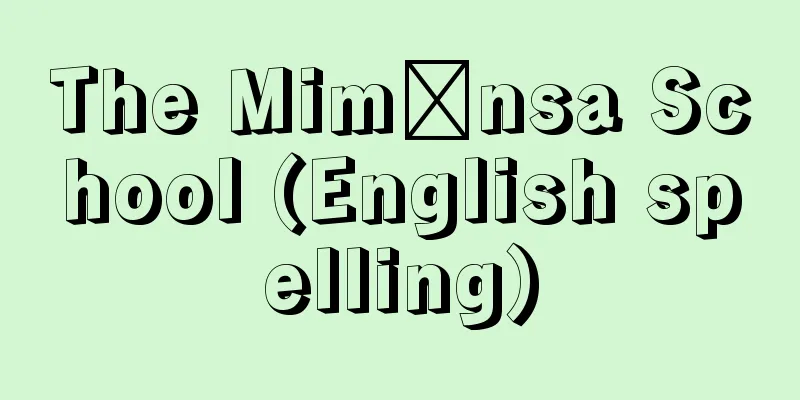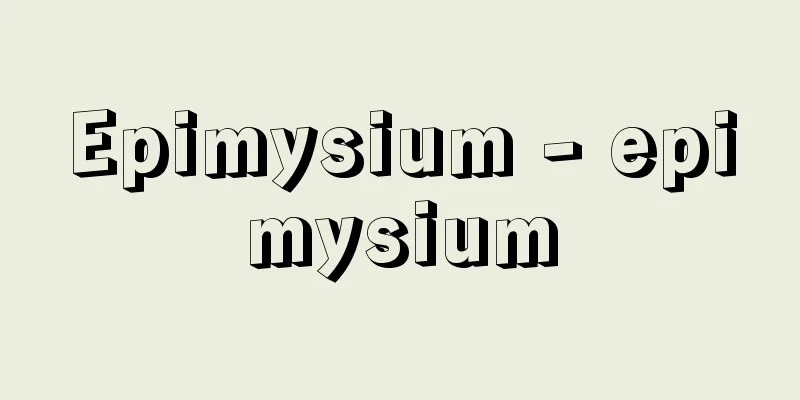The Mimānsa School (English spelling)

|
One of the six schools of Indian philosophy. It has a sister relationship with the Vedanta school. It is the most orthodox school in the sense that it emphasizes the authority of the Vedic scriptures and the dharma (religious obligation) prescribed therein, that is, the performance of rituals. Discussions and studies to eliminate and unify the contradictions between the various theories on the details of performing rituals have been conducted since ancient times, and were called Mīmānsa (study), but from that tradition, philosophical and hermeneutical discussions were accumulated and systematized, centering on the general meaning of performing rituals, and it was established as a school. Jaimini, who is said to be the founder, is also said to be the author of the Mīmānsa-sutra, the fundamental scripture of the school. In response to this book, Savarasbāmin (c. 550) wrote the Mīmānsa-sutra Commentary. Furthermore, Kumārīla (c. 650-700) and Prabhākara (c. 700) each wrote commentaries on it, and became the founders of the Bhatta and Guru schools. The Mimamsa school believes that words are eternal, and that the Vedic scriptures, which are made up of words , are eternal and authorless. In the process, they deny the existence of an absolute God, stating that gods are merely one of the tools used to perfectly perform rituals. They also believe that the rewards of a ritual will always be realized in the future through the additional energy that is generated in the priest immediately after the ritual is performed, and they assert the existence of an Atman (self) as the recipient of these rewards. As a practice for attaining liberation, they take a stance based on the theory of the union of knowledge and action. Furthermore, the principles of scriptural interpretation established by this school are also used in the interpretation of legal codes, and are recognized as having universal value. [Haruo Kurata] [References] | | |Source: Shogakukan Encyclopedia Nipponica About Encyclopedia Nipponica Information | Legend |
|
インド六派哲学の一つ。ベーダーンタ学派と姉妹関係にある。ベーダ聖典の権威とそれに規定されるダルマ(宗教的義務)すなわち祭祀(さいし)の実行を重視するという意味でもっとも正統的な学派。祭祀実行上の細部に関する諸説間の矛盾を、除去統一するための論議考究は古くから行われ、ミーマーンサー(考究)とよばれたが、その伝統のなかから祭祀実行の意義一般を中心に哲学的・解釈学的論議が積み重ねられ、体系化され、学派として成立したものである。開祖とされるジャイミニは、学派の根本経典である『ミーマーンサー・スートラ』の作者ともされる。この書に対して、シャバラスバーミン(550ころ)が『ミーマーンサー・スートラ注解』を著した。さらにそれに対して、クマーリラ(650―700ころ)とプラバーカラ(700ころ)がそれぞれ復注を書いて、バーッタ派、グル派の祖となった。 ミーマーンサー学派では、ことばは永遠であると考え、ことばからなるベーダ聖典も作者をもたぬ永遠の存在であると主張する。その過程で絶対神の存在を否定、神々は祭祀を完璧(かんぺき)に遂行するための道具立ての一つにすぎぬとした。また、祭祀の果報は、祭祀実行直後に祭主に新たに生ずる余力を介して将来かならず実現されると考え、その果報の享受者としてのアートマン(我)の存在を主張した。解脱(げだつ)のための実践としては、知行併合論(ちぎょうへいごうろん)的立場をとる。また、この学派で確立した聖典解釈上の諸原則は法典解釈の場などでも援用され、普遍的な価値を認められている。 [倉田治夫] [参照項目] | | |出典 小学館 日本大百科全書(ニッポニカ)日本大百科全書(ニッポニカ)について 情報 | 凡例 |
>>: Mimana Japanese Government
Recommend
Ergastērion (English spelling)
An ancient Greek word meaning "workplace.&quo...
Perigee passage
…On the other hand, the point farthest from the E...
Brezovački, T.
...However, it was not until the 19th century tha...
bond paper
…It belongs to the category of writing and drawin...
Dal'nevostochnyi ekonomicheskii raion (English notation)Dalnevostochnyiekonomicheskiiraion
...is often not included in the Siberian region. ...
Gustav Adolf
…reigned 1611-32. Also called Gustav Adolf. First...
Itako
Miko (shrine maidens) are widely distributed in t...
Pardon power - onsha taiken
...Supreme Command), (7) Prerogative of Military ...
Key West (English spelling)
A resort town on Key West Island, at the southwest...
Rosa de Lima (English spelling)
1586‐1617 A saint born in Lima, Peru. She was call...
Heliopolis (Cairo) (English spelling) Heliopolis
...The role of Cairo radio and Egyptian films was...
Rice Price Deliberation Council
This was an advisory body established in the Food...
Cut mulberry style - cut mulberry style
…However, even in this case, the creation of mulb...
Resurrection - Resurrection
[1] [noun] ① To come back to life; to revive; to r...
Mitsui Hachiroemon
The hereditary name that represents the Mitsui fam...









